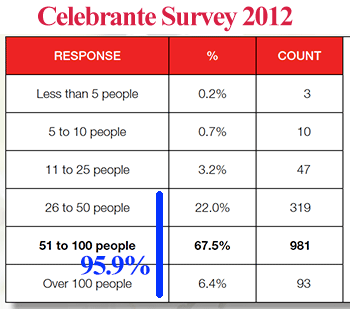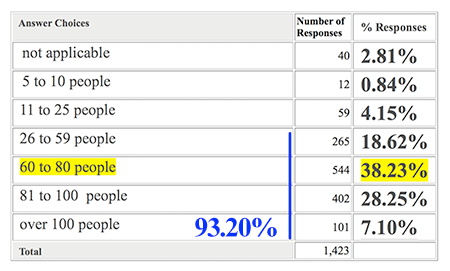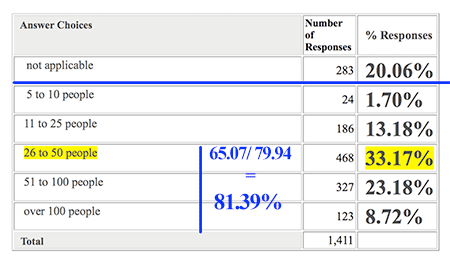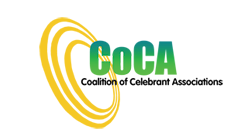The Subject Matter Expert Committee did an analysis of the requirements for the whole course on the basis that
- The Certificate IV should be of approximately 6 months full-time or 12 months part-time duration, and
- Celebrancy does not lend itself to either placements or mentor-ship as can be the case in other VET qualifications.
Given that celebrants provide ceremonies for one-off, once in a lifetime occasions, the student at the completion of the qualification should be competent to design, deliver and review any ceremony as required by the client (individual, family, group or community) for a range of occasions (including those related to loss and grief.)
That a specific celebrant after graduation chooses to specialise, for example in marriages or funerals, is an individual choice, but not the function of the Celebrancy Qualifications that under the VET system relates to the Council of Australian Governments (COAG) 2012 policy objective provide ‘a productive and highly skilled workforce which contributes to Australia’s economic future, and to enable all working age Australians to develop the skills and qualifications needed to allow them to participate effectively in the labour market.’
As such the SMEG group recommends the Registered Training Organisation's delivering this qualification
- set up an environment whereby the 'trainee' celebrant is to act pro-actively to gain experience in offering real ceremonies (eg their own families and friends) and where-ever possible, to offer 'real' ceremonies (even if the audience is aware that the celebrant is in training and have agreed to assist the celebrant in gaining hands-on experience),
- create assessment tasks that require common sense, logic thinking and creativity as well as enabling the trainee to assess their suitability for celebrancy work, and
- make use of the wide-range of web and other technology in their assessment tasks,so the trainee has the best chance of operating a viable celebrancy practice post-qualification.
The table below suggests that creating ceremonies 'from scratch' can be organised around can be done 6 ceremonies which could cover requirements for the funeral/ memorial unit CHCCEL008 as well and the trainee informed prior to the course that they will be required to set these opportunities up. See Blue Text in CHCCEL004.
Organising these opportunities would also provide the opportunities to cover the associated assessment tasks in CHCCEL002 and CHCCEL003.

As regards the assessment tasks for the Marriage Elective Units, Registered Training Organisation should be able to design a minimum of 6 different scenarios CHCCEL006 upon which the student can based their work to meet the requirements of CHCCEL006 and CHCCEL007. See Blue Text in CHCCEL006.
These scenarios plus extra ones, could be used to ensure that the graduate can apply the principles of the Marriage Act for assessing whether a couple are free to marry, organise and oversight the appropriate paperwork, conduct a valid marriage ceremony and know how to register the marriage; and how to use the Marriage Guidelines for extra support.
Finally there has been some concerns raised about delivering a ceremony to an audience of a minimum of 20 people.
The Celebrante Survey 2012 showed over 90% of weddings were delivered to an audience of over 25 people.
The high numbers of guests at civil ceremonies were also shown by the CoCA 2015 Survey with over 90% of marriage ceremonies having audiences of over 25 guests, and over 80% of other ceremonies reported as having over 25 guests. Therefore all graduates need to be confident in presenting to a large audience, and using PA equipment to do so.
Q18 For the majority of your marriages, what would be the approximate number of guests?

Q19 For the majority of other ceremony work, what would be the approximate number of guests?

Please contact CoCA for more information about the Competency Units and their assessment.
| Competency Assessments for Celebrancy | |||||
| Core | CHCCEL001 | • review and reflect on information from a range of sources about celebrancy practice | |||
| • evaluate and articulate requirements for sustainable celebrancy practice | |||||
| • developed and documented a plan for own celebrancy practice, including: own goals, strategies, resources and systems, professional development strategy, personal care plan | |||||
| CHCCEL002 | • 9 interviews - by phone, face2face, electronic means | Student to organise as part of their being pro-active. | and record on Skype or such | ||
| • 9 interviews - love, life and loss | |||||
| • 9 interviews - 2 different cultural groups from the celebrants | |||||
| • 6 service agreements | |||||
| CHCCEL003 | • 10 each of poems, prose, music | ||||
| created & written in full 3 ceremonies (love, life, loss) | created & written in full 3 ceremonies (love, life, loss) | ||||
| CHCCEL004 | • pre-planning form & checklist for 3 ceremonies | presented at least 6 ceremonies - student to organise with their own networks | eg birthday, anniversary and mothers or fathers days ceremony plus | ||
| • presented at least 3 rehearsals | |||||
| • presented at least 6 ceremonies, to include at least 3 of the following: engagement, a baby naming or blessing, birthday, anniversary (wedding or other), graduation celebration or party, mother’s day or father’s day celebration | 3 of these 6 - engagement, a baby naming or blessing, birthday, anniversary (wedding or other), graduation celebration or party, mother’s day or father’s day celebration | two memorials and one a wedding anniversary | |||
| • presented ceremonies for audiences of varying size, including at least one for an audience of over 20 people | at least one for an audience of over 20 people - wedding anniversary / marriage celebration for newly marriage for Marriage Unit 007 | ||||
| • presented ceremonies requiring the use of public address (PA) equipment on at least 2 occasions | |||||
| • presented ceremony content that includes: 3 different styles of poetry, 3 different styles of music lyrics, explanation of 3 different symbols to the audience | |||||
| • completed a process of evaluation for 6 ceremonies and identified and documented things that went well and potential areas of improvement in planning, preparation and delivery. | evaluation for 6 ceremonies | evaluation for 6 ceremonies | |||
| Marriage | CHCCEL005 | • used critical thinking skills to identify, review and collate information from authoritative sources about requirements for marriage celebrancy practice | |||
| • developed and documented an outline of the systems and procedures, and the associated costs, required to support a marriage celebrancy practice in the context of legal requirements. | |||||
| CHCCEL006 |
• conducted first interviews, assessed eligibility and provided information according to legal requirements for clients presenting with diverse circumstances, that individually or cumulatively include each of the following scenarios: • neither party has been married previously |
6 scenarios or more for marriage work covers units 006 and 007 and be used for 005 | |||
| • prepared accurate pre-ceremony documentation for atleast 3 ceremonies according to legal requirements, including Notice of Intended Marriage form, Declaration of No Legal Impediment to Marriage form, Official Certificate of Marriage, Form 15, and Record of Use form | prepared accurate pre-ceremony documentation for at least 3 ceremonies | ||||
| • created required legal wording for at least 5 unique marriage ceremonies of varying duration, ensuring the marriage is valid under Australian law, where • each ceremony has different wedding vows incorporating the legal wording for vows • at least 1 ceremony where delivery will raise marriage law issues, such as where an interpreter must be used or another person will be centrally involved in the ceremony. |
created required legal wording for at least 5 unique marriage ceremonies | ||||
| CHCCEL007 | • prepared for, presented, documented, registered and evaluated in writing, at least 5 marriage ceremonies in line with legal requirements and marriage celebrant Code of Practice, which must include: • ceremony involving a legal issue impacting the ceremony delivery, such as where another unauthorised person will be centrally involved or conducting the ceremony in conjunction with the celebrant • ceremony involving other presenters and performers • ceremonies with varying sized audiences including at least 1 of more than 20 people. |
prepared for, presented,documented, registered and evaluated in writing, at least 5 marriage ceremoniesincluding at least 1 of more than 20 people. | wedding anniversary ceremony / marriage celebration under 0004 | ||
| Funeral | CHCCEL008 | • planned, and evaluated at least 4 different ceremonies, includingboth funerals and memorials | presented 2 ceremonies - one or both of which can be for | plus respond to one other scenario | |
| • written and evaluated at least 4 eulogies | CHCCEL003 | ||||
| • presented funeral or memorial ceremonies using presentation techniques suited to those ceremonies for at least 2 of the following situations, including the delivery of at least 1 eulogy • death of a young person • an unexpected accidental death • an older person. |
CHCCEL004 | ||||
| CHCCCS017 | • responded effectively to at least 3 diverse situations of loss, grief, bereavement or trauma | · responded effectively to at least 3 diverse situations of loss, grief, bereavement or trauma | |||
| • engaged with people using effective communication skills at least once that included: • empathic listening skills • verbal and non-verbal techniques • providing information clearly and sensitively • obtaining feedback to confirm understanding |
|||||
| SIFXIND00 | • apply funeral services industry information and specific workplace policies and procedures to daily work | ||||
| • use communication techniques and industry protocols in interactions with others. | |||||
| • Evidence of performance on two or more occasions is required to demonstrate consistency of performance and ability to respond to different situations. | Evidence of performance on two or more occasions is required to demonstrate | ||||


